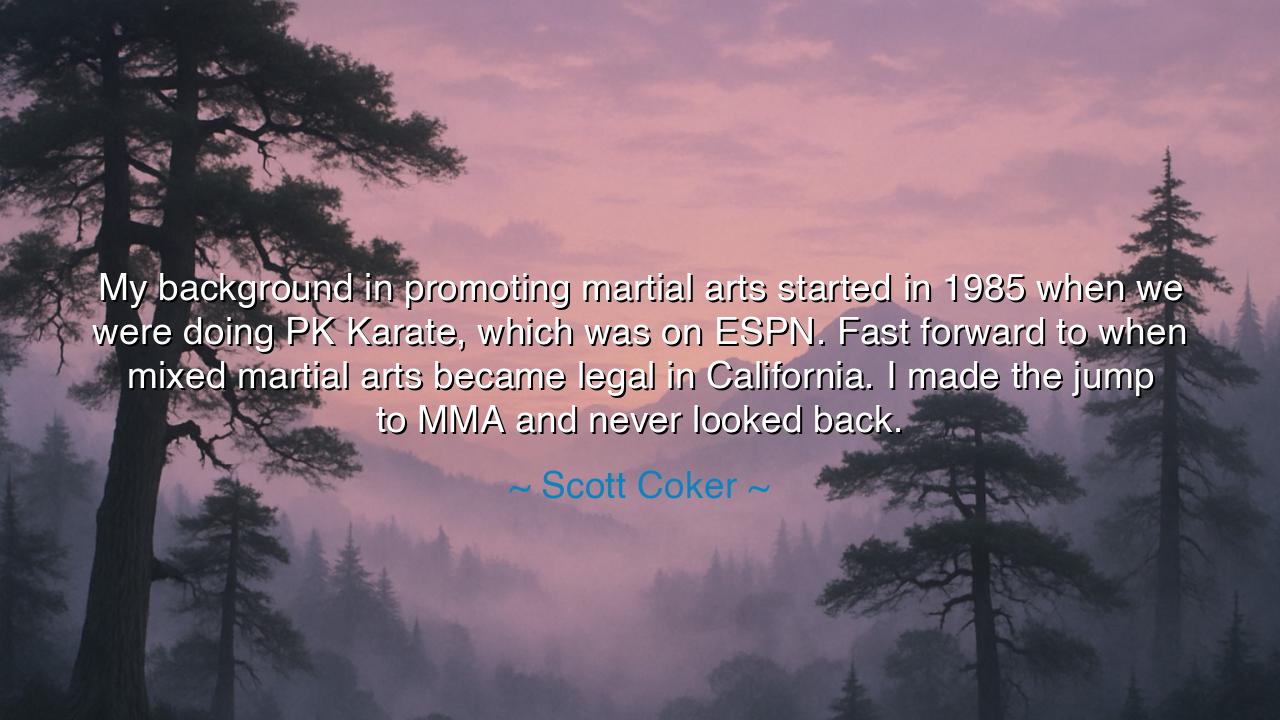
My background in promoting martial arts started in 1985 when we
My background in promoting martial arts started in 1985 when we were doing PK Karate, which was on ESPN. Fast forward to when mixed martial arts became legal in California. I made the jump to MMA and never looked back.






"My background in promoting martial arts started in 1985 when we were doing PK Karate, which was on ESPN. Fast forward to when mixed martial arts became legal in California. I made the jump to MMA and never looked back." Thus spoke Scott Coker, the visionary architect who helped shape modern combat sports. In his words, we see the journey of a man who has walked the long road from humble beginnings in karate promotion to becoming one of the great stewards of mixed martial arts (MMA). His story is not only about sport but about transformation, perseverance, and the courage to leap when history opened its doors.
The origin of this wisdom lies in the early days of martial arts as a spectacle in America. In the 1980s, karate tournaments and kickboxing shows were carried to television screens through pioneers like Coker. These events were often small, experimental, struggling for legitimacy in a society that viewed martial arts either as exotic curiosities or violent amusements. Yet, in promoting PK Karate, Coker and others laid the foundation stones for the eventual rise of global MMA. The seeds planted in those years would not bear fruit until decades later, when the world was finally ready to embrace the fusion of fighting styles.
The turning point came when MMA became legal in California, a watershed moment that symbolized the sport’s emergence from the shadows into legitimacy. For years, MMA had been dismissed as “human cockfighting,” banned in many states, scorned by politicians and the media. But regulation and legalization transformed it, establishing rules, weight classes, medical oversight, and the framework that would allow it to thrive. In that moment, Coker saw not just an opportunity, but destiny itself: the chance to take what had once been forbidden and elevate it to one of the great arenas of modern sport.
Consider also the parallel in history with the rise of boxing in the early 20th century. Once outlawed in many places, boxing too was seen as brutal and savage. But when brought under legal sanction and proper regulation, it became a respected discipline, producing legends like Jack Johnson, Joe Louis, and Muhammad Ali. Just as boxing’s legitimacy gave birth to global heroes, the legalization of MMA in California allowed new warriors—fighters like Fedor Emelianenko, Daniel Cormier, and Ronda Rousey—to step into the light, carrying the spirit of martial arts to millions. Coker’s leap mirrors this same historical arc: he saw where the tide was flowing, and he chose to ride it.
His words—“never looked back”—carry a sense of irrevocable transformation. They remind us that when a path opens that aligns with one’s calling, hesitation must give way to boldness. To turn back would have been to cling to the past; to move forward was to embrace the future of combat sports. In this, Coker’s story is not just about fighting, but about life itself: the courage to change when the world changes, the wisdom to see when opportunity and destiny align.
The lesson is profound: greatness belongs not only to those who fight in the cage, but also to those who dare to believe in the vision of what can be. Progress comes when pioneers, like Coker, nurture what is small, defend it when it is scorned, and leap forward when it becomes possible. This is true in sport, in art, in invention, and in life. To hesitate is to lose the moment; to leap is to create history.
What practical steps must we take? When facing change, cultivate the eyes of vision—see not only what is, but what might be. Support the causes and crafts that are not yet accepted but carry the spark of greatness. And when the time comes that opportunity and conviction meet, act with courage. Do not be shackled by nostalgia, but, like Coker, never look back once you have chosen the higher path.
So let Scott Coker’s words echo beyond the world of martial arts: the path of destiny reveals itself to those who honor the past, seize the present, and dare to leap into the future. For in that leap, whether in the cage or in life, lies the chance to build something that endures for generations.






AAdministratorAdministrator
Welcome, honored guests. Please leave a comment, we will respond soon